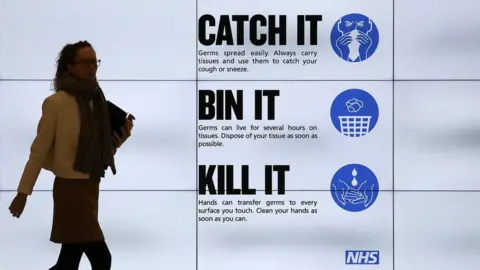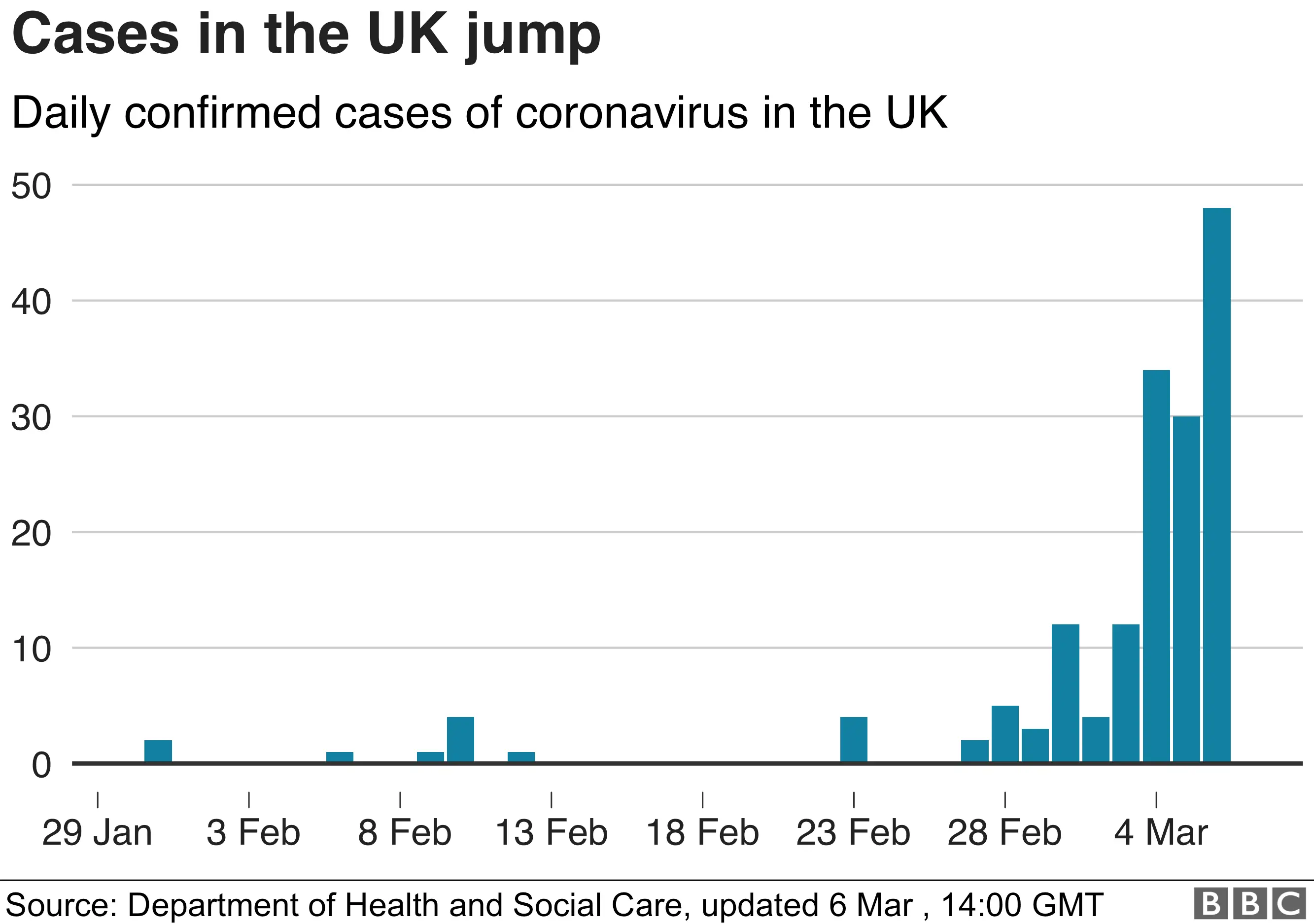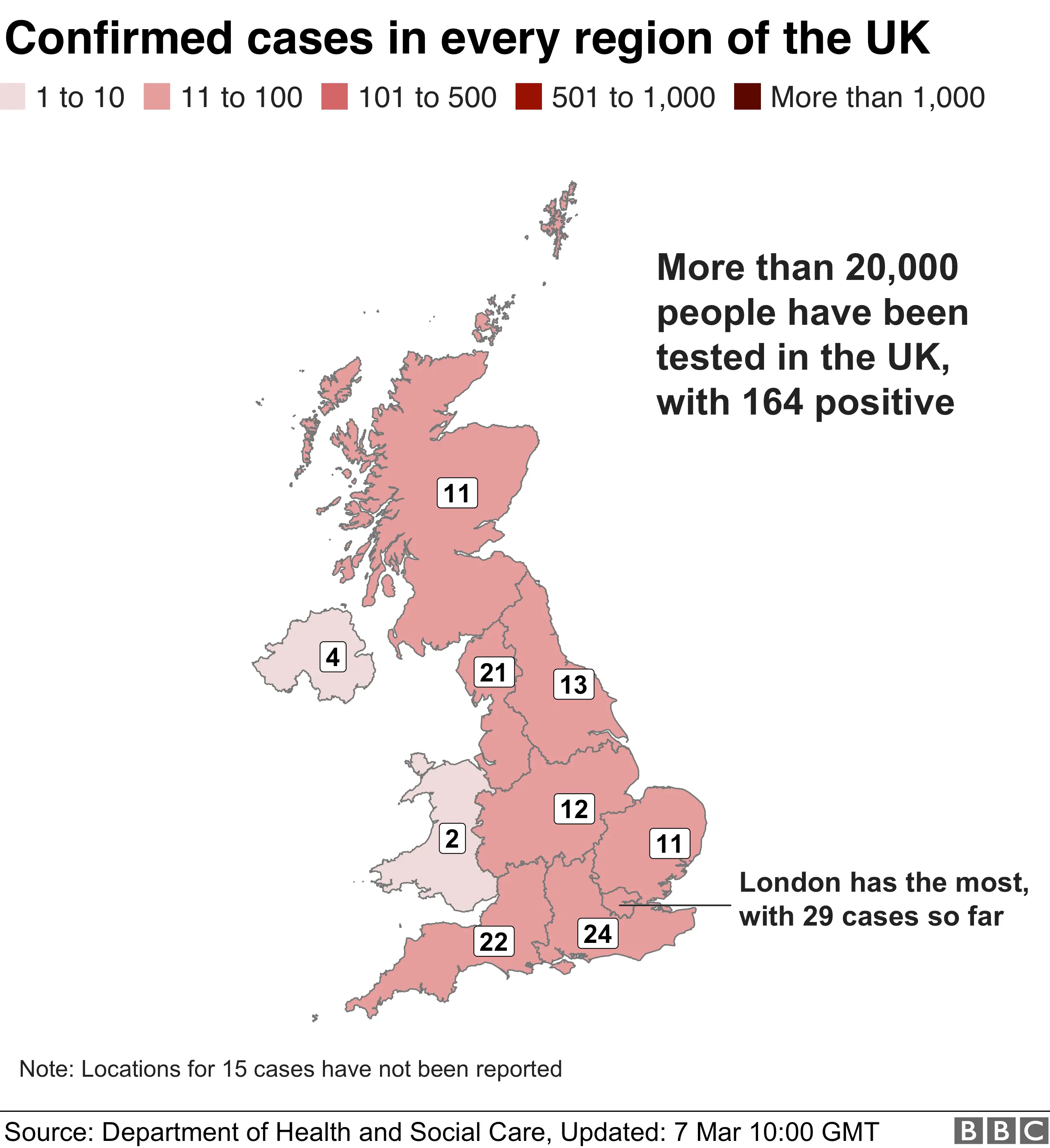Coronavirus: UK still 'in containment phase' of virus response
 PA Media
PA MediaThe UK remains in the "containment" phase of tracing coronavirus cases to prevent it spreading in the community, England's deputy chief medical officer has said.
Jenny Harries told the BBC a decision about the next phase of delaying the spread of the virus would depend on how fast the number of cases rose.
But she said the UK was "teetering on the edge" of sustained transmission.
Measures to slow the virus needed to be "proportionate", she said.
And Dr Harries warned the public against panic-buying, saying it was unnecessary and it could "engender panic in itself".
On Friday, a man in his 80s with underlying health conditions became the second person in the UK to die after testing positive for the virus at Milton Keynes Hospital.
The UK's first death - a woman in her 70s who also had underlying health conditions - was confirmed on Thursday. A British man also died last month in Japan after contracting the virus on board the Diamond Princess cruise ship.
The number of confirmed cases of Covid-19, the illness caused by the virus, rose to 164 in the UK on Friday, with 20,338 people tested.
In Scotland, five more cases were confirmed on Saturday, bringing the total there to 16.
New figures for the rest of the UK have not yet been released.

- LIVE UPDATES: Live coverage of developments
- EASY STEPS: How to keep safe
- A SIMPLE GUIDE: What are the symptoms?
- GETTING READY: How prepared is the UK?
- MAPS AND CHARTS: Visual guide to the outbreak

The UK's strategy on responding to the virus has four phases: containment, delay, mitigation and - running alongside these - research.
Up until now, the containment phase has involved catching cases early and tracing all close contacts to halt the spread of the disease for as long as possible,
Moving into the delay phase could see the introduction of "social distancing" measures, such as closing schools and urging people to work from home.
Dr Harries said that the "junction" between containment and delay is "when we can see inevitably that we are moving from a few cases across the population to sustained community transition".
"We are, if you like, teetering on the edge, but not there just yet," she said. "We have surveillance systems in place and we're watching that on a daily basis."

Dr Harries said a decision on formally moving to the next phase would depend on how quickly the number of cases rises.
The delay phase would focus on trying to prevent cases from rising too sharply, pushing the peak of the epidemic out of the winter period and helping health and social care services manage the flow of patients, she said.
Scientific advisers are due to review the evidence next week on measures such as restricting large gatherings, she said.
Dr Harries said they needed to "balance the benefits" with minimising disruption to people's lives and the economy, as well as ensuring that they are implemented at the time when they will have the most impact.
On Monday, the government is meeting with sporting bodies and broadcasters to discuss staging sports events behind closed doors if the coronavirus outbreak worsens and mass gatherings are banned.
It comes as the Women's Six Nations rugby match between Scotland and France in Glasgow on Saturday was postponed after a Scottish player contracted the virus.
Scotstoun sports campus, one of Glasgow's largest leisure complexes which includes the stadium where the match was due to take place, has also been closed as a result.
Meanwhile, more than 140 British nationals are on board a cruise ship which was barred from docking in San Francisco, California, after an outbreak of the virus.
'Great deal of trust'
US Vice President Mike Pence said the Grand Princess - sister ship of the Diamond Princess, which was the site of a major outbreak in Japan - would be sent to a non-commercial dock where all 3,533 passengers and crew would be tested.
Jackie Bissell, from Dartford in Kent, said passengers have had little information about what would happen to them since a note was pushed through their door two days earlier saying the virus may be on the ship.
"You can't go out. You can just go out in the hall if somebody taps your door. They put your food outside, drop your menus inside and that's about it," the 70-year-old said.
Dr Harries said she has a "great deal of trust" in the US public health system and said the Foreign Office was "extremely active" in looking after UK citizens abroad.
As of Friday, there were 147 coronavirus cases in England, four in Northern Ireland and two in Wales.


About 45 of the confirmed cases have been self-isolating at home, while 18 people have recovered.
Up to 30 cases have no known link to foreign travel, which the BBC's medical correspondent Fergus Walsh said "suggests the virus is establishing a firm foothold".
Globally, the number of coronavirus cases has now passed 100,000, with 3,400 deaths.
The government has updated its advice for travellers from Italy - the country in Europe that has been worst-affected by the virus with more than 4,600 cases.
It now says people who develop symptoms after returning from any part of Italy - not just the north of the country - should self-isolate, while those returning from quarantined areas should self-isolate even without symptoms.
The Foreign Office is also warning travellers to Moscow in Russia that they may be told to self-isolate for 14 days on arrival from the UK, as part of measures to control the virus.
It says in a small number of cases, foreign visitors have been placed in enforced quarantine if they have not complied.

Have you or anyone else you know been affected by the coronavirus? You can tell us your story by emailing [email protected].
Please include a contact number if you are willing to speak to a BBC journalist. You can also contact us in the following ways:
- WhatsApp: +44 7756 165803
- Tweet: @BBC_HaveYourSay
- Send pictures/video to [email protected]
- Upload your pictures / video here
- Please read our terms of use and privacy policy
